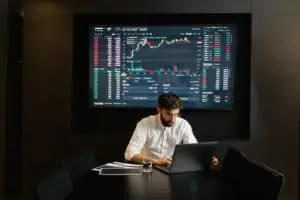Great Resignation and Market Impact
The Great Resignation is defying the ability for traditional economic models to predict the labor market and is changing economic growth. And while the permanent impact of the global pandemic is yet to be seen, it is clear that companies will need to respond to the change in the marketplace.
And as employees reevaluate their lives and companies struggle to hire; the question is evolving from “how long will this last?” to “Is this permanent?”. And while this question is impossible to answer, looking at the root causes can help define a path forward.
Past economic models are not predicting current patterns. According to traditional economic models, workers should have returned when increased unemployment benefits lapsed. And many economists predicted rapid job growth in September as out of work employees flocked to job openings. The job spike didn’t happen. And while many are revising predictions with the expectation that hiring will be slower, there is the possibility that a different trend emerges.
Causes of the Great Resignation
Changes in Employee Mindset
There is no doubt that the COVID-19 Pandemic caused personal inflection and has led to the Great Resignation. The combination of losing jobs, the economy undergoing a rapid decline, along with the fear of the virus and forced isolation caused a lot of people to re-evaluate their lives. Anecdotal research is indicating life, health and family are now being prioritized over career and success.
Increased Government Support
Increases in unemployment benefits, child tax credits and eviction moratoriums helped fuel stabilize workers combined with forced isolation, reduced entertainment budgets created an opportunity for low wage workers to reduce costs and increase their income. This undoubtedly helped fuel the Great Resignation, but the question remains as to why these workers have not re-entered the workforce as enhanced benefits expire.
What also cannot be explained is why The Great Resignation is global. Countries in Europe and Australasia are experiencing similar conditions with very different economies and employment structures than the United States.
Wide Scale Layoffs
Layoffs were necessary for many companies to survive. However, some companies took a worst-case approach when reducing their workforce and are now having difficulty with recruiting. And this wasn’t just for low wage industries. This has also been a challenge for higher wage occupations such as the tech and health sectors being particularly effected.
Some specific scenarios have come across our consulting activities.
- Car dealership parts managers in expensive metro areas released drivers only to have many of leave the city for less expensive locations.
- Other car dealerships were unable to re-hire their drivers because they started driving for Uber Eats, Doordash, Postmates, Roadie and others as their business expanded during the pandemic.
- Tech companies had difficulty rehiring staff as programmers found better jobs or have started their own companies.
- Senior staff members in their 50s and 60s decided to retire instead of returning to the office.
- Minimum wage hospitality workers took the time during the pandemic to seek education on skill trades and are not returning to their previous hospitality jobs
- Workers reduced their expenses during the pandemic and have become single earner households.
Resurgence of Entrepreneurs
As people are starting their own companies, they are fueling the Great Resignation by leaving the workforce. Some people started their own businesses during the pandemic. The pandemic demonstrated to a lot of workers that their job was not as stable as they thought. And these workers have decided to start their own companies after being laid off by long-term employers facing the prospect of an ongoing pandemic.
And this trend is significant. The labor department is showing an increase in small business applications between 200% and 600% year over year. And to reinforce this, panel vans are the hottest used car on the market. With some car dealers buying used vans wherever available and having them shipped cross country. And as covid recedes, these new businesses are having an impact on the economy.
On Call Opportunities
Work opportunities such as Uber and Lyft were present prior to the pandemic. However, these opportunities have become more appealing. And, services such as Roadie, Postmates, Doordash and others have exploded during and after the pandemic. When given the opportunity to schedule themselves, work when available, and make reasonable money, a lot of workers have opted not to return to their minimum wage jobs.
Remote Working
Extended remote working has changed employee and employer perspectives on remote work. For employees it has meant less time commuting, more time with family and lower overall household costs for food, fuel, and cars. And most importantly it has created more flexible schedules and changed the employee perspective on what kind of work/life balance was possible.
But employees are not the only ones who have benefitted. Many companies have seen productivity increases, while being able to reduce their office size and broaden their employee pool.
The Great Resignation and the Declining workforce
Died from COVID
The fact is that people died during the COVID Pandemic. In the United States the official number is over 700,000 deaths in the United States and over 4.5 million dead worldwide. And official numbers are generally conservative. While many who have died are elderly, between 200,000 and 300,000 Americans have been removed from the workforce because they are dead. And many others have been disabled by long COVID.
Decline in Population Growth
The US population has been experiencing birthrate declines and immigration policy related restrictions on immigration have further slowed the arrival of new workers. The net result is the reduction of workers to fill job vacancies.
The onset of the COVID-19 Pandemic has only made immigration declines more pronounced. And this trend does not only effect illegal immigration, it also effects legal migration. Countries such as Australia, the United States and Europe — who rely upon the migration of tech workers to fill roles —are finding a shrinking pool of certain workers.
Retiring Boomers
The great Resignation is also being fed by Baby Boomers who are leaving the workforce. According to Bloomberg, over 3 million people have retired early because of investment gains during Covid. Baby boomers still make up a large percent of the workforce with many still under retirement age. And elevated risk from COVID infection, effective retirement planning and portfolio gains from stock and home price gains have made early retirement an option for many.
Economists have long been concerned about the impact of boomers leaving the workforce and early indications are that COVID is accelerating their departure. And the departure of boomers affects more than just workforce numbers. These highly skilled and knowledgeable workers are difficult to replace.
Single Income Households
Many parents have fueled the Great Resignation by leaving the workforce. Lockdowns reduced discretionary expenditures for many consumers. Movie theaters, bowling alleys, bars, restaurants, and a variety of other entertainment venues were no longer available which reduced personal expenditures. For many, this revamped their budgets and made one-household incomes possible. When combined with fewer childcare options, many participants of two income households have opted to leave the workforce to take care of their families.
Vaccine Mandates
Some workers may refuse to become vaccinated against COVID and are resigning to join companies that do not have vaccine mandates. As some companies mandate vaccines for their employees, some employees could refuse and change jobs. And while the effect of this is unclear, it is likely to remove some workers from the workforce as some vaccine objectors are likely to start their own business, retire and move to one household incomes.
Are Workforce Expectations fueling the Great Resignation?
Jobs are open and qualified employees are available to fill those jobs, yet employment numbers are not increasing. This means that something is missing. But what’s missing? Surveying your employees is a good way to get a sense of the changes that are affecting your team and what actions you have taken to improve employee satisfaction. And while these expectations are still fluid, early research is staring to identify some possibilities.
- Remote working options – Some employees enjoyed the flexibility remote working provided and are seeking to continue as remote employees.
- Work environment – Employers may need to create more positive work environments with more flexibility and employee recognition. Traditional environments and perspectives may no longer be effective.
- Work safety – Covid raised awareness of the need for a healthy and safe working environment.
- Benefits/Options – Better health and retirement benefits or stock options may be a necessary add over traditional benefits.
Long Term Effects of the Great Resignation
Only time will show how people may respond once the psychological effects of the pandemic are gone. However, there are some trends to watch as the marketplace proceeds. And some creativity may be necessary to support hiring and retention.
- COVID deaths, early retirements and people who opt out of the workforce to tend to a child or ailing family member may permanently decrease the workforce unless immigration policies support the replacement of lost workers.
- Companies may have to pay more or adapt to smaller headcounts. This may create opportunities for workplace automation.
- Companies may need to provide more value to their employees than a salary, benefits and promise for growth.
- Work environment and atmosphere could be more important
- Employers may need to get creative with compensation packages
- Remote working options may become standard
- Compensation may need to change
- Employers may need to entice new entrepreneurs away from their startup businesses.
- Benefits that create employee security could have an outsized effect on retention and recruiting.
- The increase in entrepreneurs could change the market
- Small new competitors are likely to emerge and may disrupt existing markets
- Talented people could remove themselves from the workforce as their entrepreneurial ventures become successful.
- A brain-drain is likely as entrepreneurs move out of the workforce.
How Companies May Win
Not all news is bad news for companies. First of all, these changes have not necessarily affected all employees and traditional hiring and employment practices are still working for some business. Secondly, with any change comes risk AND opportunity. And companies who respond effectively could create a competitive advantage for themselves. As with any market change, The key is the timing of the response. Companies who act too quickly may create permanent cost increases and those who wait too long could damage their market position. And even without a response, some organic benefits are starting to emerge.
- Some studies are revealing that remote employees are more productive and happier
- Fewer on-site workers, could require less office space and lower capital expenditures
- Remote working can remove geographic limitations and make it easier to fill specialized positions
- A smaller workforce could create the opportunity to eliminate procedural waste and increase productivity
How You Can Reduce your Risk During the Great Resignation
Creating new job opportunities for existing employees and helping your employees make more money are ways to retain your staff. Also, there are outsourced services you can use to fill personnel gaps until you can hire new people. The following articles provide some of the expanded services and outsourced options that can be used by car dealerships to retain staff and grow the business..






